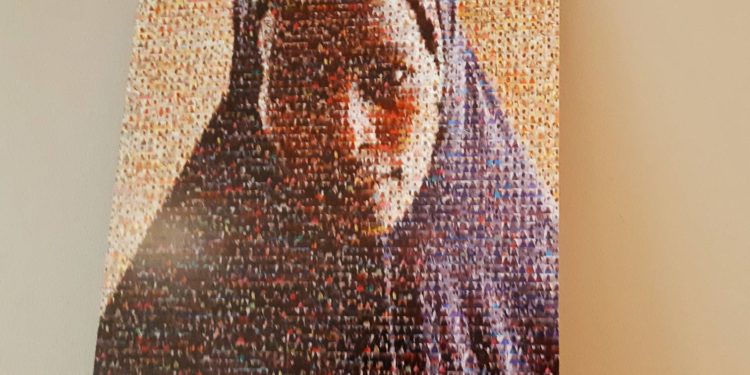Nigerian activist, Kellu Haruna, founder of the Knifar Movement which campaigned for victims who were killed and detained by the Nigerian army, was honoured with a portrait during ASP18.
The portrait was a mosaic of photos donated by members of Knifar.
Mrs Haruna, who passed away earlier in the year, led a campaign demanding for the release of men captured and held by the Nigerian government following the quelling of the Boko Haram insurgency in the North of the country.
Kellu, from Andarra village in Borno State, was a mother of four – three girls and a boy. Her husband, Haruna Modu, is a 45-year-old trader. The family survived Boko Haram rule in 2015 and after a failed attempt to escape the area controlled by the Islamist rebels, they managed to escape their village in December of the same year and fled to Cameroon. The Cameroonian army stopped them and handed them and other people fleeing the Boko Haram violence over to the Nigerian army.
The men in the group were detained at Maiduguri Maximum Security Prison run by the military and the women and children held at the Bama Medical camp.
The women were not allowed to leave the camp even to go look for food. Conditions of the detainees were deplorable, including poor sanitary facilities, lack of food and a lack of access to medicine. The women and children were subjected to sexual exploitation by members of the military.
In the rapidly deteriorating conditions in the camp, Kellu lost her mother and one of children.
Severely malnourished and sick, Kellu and more than a thousand other detainees were evacuated from the camp in 2016 by the Red Cross to seek access to better healthcare in Maiduguri, the capital of Borno state.
Upon recovery, Kellu led a group of women formerly detained at Bama medical camp to find out the whereabouts of their arrested husbands.
The women formed the Knifar Movement – a group of more than 2000 internally displaced women from Borno state to agitate for the release of their husbands who are detained by the military on suspicion of being members of Boko Haram and seek justice for the more than 1000 people who died as a result of malnutrition, disease and poor treatment in detention camps across the state between 2015 and 2016.
Knifar petitioned the Nigerian National Assembly and the President seeking release of their husbands as well as justice for those who died of hunger in the camps, she also met with ICC Prosecutor Fatou Bensouda in 2017 over the matter.
Kellu died of a heart condition in October 2019 a day after Fatou Bensouda met with Nigerian officials in Abuja over the matter.
“Kellu’s life and struggle tells a much bigger story. The heartbreaking reality of passing without seeing justice, courage amidst despair, a voice that was loud but yet to be heard,” Netsanet Belay, Amnesty International’s Advocacy and Research Director said of her passing.







